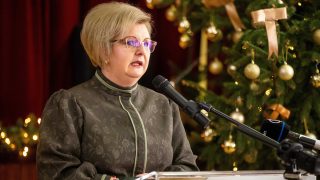Viktor Orbán has been working for three years to find a new political home for Fidesz in Europe, and now his efforts are paying off. At Fidesz’s initiative, the group Patriots for Europe has been established in the European Parliament with 84 members, becoming the third largest faction straight away.
Fidesz was forced to leave the European People’s Party (EPP) in 2021. From Orbán’s perspective, this was a particularly disadvantageous situation; one he would not know what to do with for a long time. In a previous article, we summarised that the foundation of the new party family is only a fourth-best alternative for the Hungarian Prime Minister.
- The best-case scenario would have been to remain in the EPP, the EU’s largest party family, providing the most important leaders and offering the greatest influence on European politics. We can infer from Orbán’s recent performance that he prefers to represent his own political directions through pushing the boundaries of traditional modes of political cooperation – such as the rotating presidency.
- The second-best option would have been to unite the two former party families to the right of the EPP, along with the right wing of the EPP itself. A potential alliance between the European Conservatives and Reformists (ECR) – led by Giorgia Meloni – and Identity and Democracy (ID) was made impossible by Russia’s invasion of Ukraine. While the ECR is of a more Eurosceptic disposition, it is still Atlanticist and anti-Russian, but the ID is populated by more pro-Russian populist parties. This opposition has proven irreconcilable.
- The third-best situation would have been for Fidesz to join the ECR. The Hungarian ruling party had made significant efforts for this to happen, aligning their voting lists with the ECR, and even getting to join its faction in the Council of Europe (a non-EU body). However, Meloni ultimately rejected Fidesz’s membership. The exact reasons are unknown, but it had long been known that Meloni’s team would eventually choose between Romanian nationalist AUR and Fidesz, ultimately opting for the former, markedly anti-Hungarian force, which is still more acceptable on the European stage. The reason why ECR’s faction would have been a better option for Fidesz than the previous ID party family is that it is taken more or less seriously in European politics. Additionally, the ECR was also one of the winners of the recent European elections, gaining the most significant increase in mandates alongside the EPP. Before the establishment of the Patriots for Europe, Meloni’s faction was the third largest force in the EP.
The fourth-best option is along the lines of what has happened now. However, Fidesz’s original goal with the Patriots might not have been exactly what it ultimately turned out to be. We have written earlier that the primary target of Viktor Orbán’s efforts was the Council rather than the European Parliament. The real power within the EU lies in the Council, where the prime ministers sit. All the parties Fidesz initially negotiated with are either in government or have a chance of coming to power within a few years. Currently, the Council is where Orbán is facing the most isolation, as not even his supposed allies, like Slovak Prime Minister Robert Fico, vote with him.
However, Fidesz has failed to secure most of these leaders. Fico continues to negotiate with the socialist faction. Former Slovenian Prime Minister Janez Janša will remain in the European People’s Party. The former Polish ruling party, Law and Justice, stayed with Meloni’s ECR. On the other hand, Orbán has managed to recruit the Austrian Freedom Party (FPÖ), which has a good chance of providing a prime minister after the autumn elections. Andrej Babis’ ANO party, which also has a chance of success in the Czech Republic next year, has also joined the PfE — previously, ANO sat in the liberal Renew faction. Thus, the Patriots has integrated members from four different party families, though only Fidesz’s domestic satellite KDNP is coming from the EPP, while Spanish VOX was the only one to transit from the ECR. Most constituent parties, however, were previously members of the ID faction. The biggest „trophy” is France’s National Rally, although this is not important from the Council’s perspective until 2027, as Emmanuel Macron will remain president until then.

A significant portion of the ID faction has left the family to join PfE. Beyond the parties mentioned earlier, the PfE includes:
- The Flemish separatist Flemish Interest,
- The Danish People’s Party,
- Italy’s League led by Matteo Salvini,
- And Geert Wilders’ Dutch Freedom Party.
The PfE now also includes several smaller groups, which had not previously been present in the European Parliament but would have naturally fit into the ID. These include Greek ultranationalist Voice of Logic, Latvia First, as well as Portuguese Chega, which had already joined the ID on a continental level. Also present is Czech Přísaha and Motorists (Oath and Motorists), actually consisting of two smaller delegations. One of these, Motorists for Themselves, includes Filip Turek, a racing driver known for his significant Nazi memorabilia collection and Nazi salutes.
Thus, this new party family is practically the former ID, even recruiting its former secretary-general. However, the foundation of the PfE is also a success in ridding themselves of the former ID’s biggest disadvantage, the German AfD. Minister of the Prime Minister’s Office Gergely Gulyás has already announced that Alternative for Germany would not be a member of the party family. The AfD’s series of scandals was too much even for Le Pen’s National Rally, leading to their expulsion from the ID faction. This is advantageous for Orbán, as cooperation with the AfD would destroy whatever ties Fidesz still has to the traditional German right.
It’s no coincidence that the Patriots party family chose a name that does not reflect the identity-based politics of the ID.
However, there are also disadvantages. Despite being the third-largest faction, the family’s size will have no concrete consequences in the European Parliament. The majority is still held by the EPP, the socialists, and the liberals, likely supplemented by the Greens. The most significant way a far-right bloc of this size may influence this status quo is to push the ECR – which has so far been refusing to partake in the EP majority’s work – closer to the EPP.
The future relationship with Giorgia Meloni is also likely to be strained for Fidesz. Not only have they snatched a significant party (Spanish VOX) from Meloni’s faction, but Orbán’s new faction has also taken the ECR’s third place, which Meloni’s team had planned to build significant political influence on. Although PfE has managed to recruit Italy’s League, which is part of the Italian government, Matteo Salvini’s formation is declining compared to Meloni’s party, with Salvini’s leadership role also in question.
With a bit of luck, Orbán’s isolation in the Council might be alleviated by the potential success of the Austrian and Czech member parties in winning their national elections in autumn and next year, respectively. Until then, this family remains only the fourth-best option for Fidesz.






